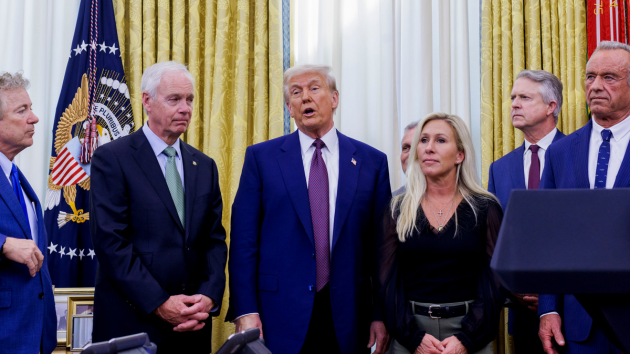Trump does not commit to vetoing national abortion ban
Written by ABC Audio. All rights reserved. on September 11, 2024
(PHILADELPHIA) — Vice President Kamala Harris and former President Donald Trump presented different visions for the future of abortion rights during their presidential debate Tuesday.
Harris promised to sign a bill that reinstates protections for abortion rights that existed under Roe v. Wade if it reaches her desk as president while Trump would not commit to vetoing a national abortion ban if it comes to his desk.
During the debate, Trump — who claimed he wouldn’t have to veto a national ban — said he believes in exceptions for abortions in cases of rape, incest and to protect the life of the mother.
“There’s no reason to sign a ban because we have gotten what everyone wanted,” Trump said, referring to leaving the regulation of abortion up to state governments.
At least 22 states have abortion bans or restrictions in effect since the U.S. Supreme Court overturned Roe — ending federal protections for abortion rights. Of those states, 14 have ceased nearly all abortion services and four have six-week bans in effect, prohibiting abortion care before most women know they are pregnant.
Three of the five U.S. Supreme Court justices who voted to overturn Roe were appointed by Trump when he was president.
Ten states will have reproductive rights-related questions on the ballot this November, nine of which specifically address abortion.
Voters in all six states that have had abortion questions on the ballot since Roe was overturned have voted to uphold abortion rights.
During the debate, Trump also falsely claimed that some states allow for the killing of an infant after birth. Killing a baby after birth is illegal in all 50 states.
Most states that allow abortions do so until fetal viability. But, there are no gestational limits on abortion in 9 states — including Colorado, New Jersey, New Mexico, Oregon, Vermont and Gov. Tim Walz’s state of Minnesota — and Washington, DC.
Advocates for abortion rights say the absence of legal consequences after fetal liability doesn’t mean doctors will try to terminate full-term, healthy pregnancies. In fact, access to third-trimester procedures is limited, costly and medically complex — typically done only when a woman’s life is threatened or the fetus isn’t expected to survive.
Many Democrats say they want to pass legislation that would codify the 1973 Supreme Court decision Roe vs Wade, which protects abortion rights up until viability.
Copyright © 2024, ABC Audio. All rights reserved.





